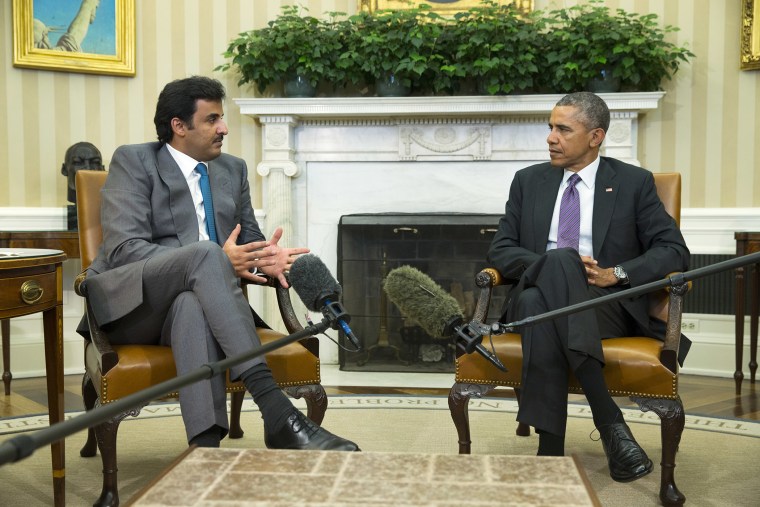Human rights defenders across the Gulf will be scrutinizing what happens when President Obama meets on Wednesday and Thursday with the monarchs of the Gulf Cooperation Council (GCC)—Bahrain, Kuwait, Oman, Qatar, Saudi Arabia, and the United Arab Emirates (UAE)—in the White House and at Camp David. They’ll be watching to see if the president’s promise to have a tough conversation about Gulf monarchs’ repression of dissent is more than just rhetoric, and whether he’ll back up his declaration that “America’s support for civil society is a matter of national security” with substance.
For too many years this administration has failed human rights defenders in the Gulf region. Encouraging words from the White House at the start of the “Arab Spring” amounted to nothing.
"Over the last four years we’ve been threatened, shot at, assaulted, tear-gassed and jailed by Washington’s Gulf allies."'
Peaceful dissidents campaigning for human rights watched as Washington quickly reverted back to its habit of cozying up to Gulf dictators, arming and equipping them as the repression intensified. Obama’s 2011 promise that his administration “cannot hesitate to stand squarely on the side of those who are reaching for their rights, knowing that their success will bring about a world that is more peaceful, more stable, and more just” is now met with hollow laughter from our colleagues jailed by Washington’s Gulf allies.
Today, peaceful dissidents across the region are in prison. Blogger Raif Badawi in Saudi Arabia was sentenced to flogging and his lawyer Waleed Abulkhair sentenced to 15 years. Saudi civil society leader Mohammed al Qahtani is imprisoned, as is Dr. Mohammed al Roken in the UAE. In Bahrain, Naji Fateel is in jail, and Ghada Jamsheer banned from travel, as is Nawaf al Hendal in Kuwait. In Oman, Said Jadad was sentenced to three years in jail after writing an open letter to Obama expressing “dismay” at U.S. human rights policy in the gulf. There are many more violations of human rights than these few cases.
RELATED: The truth about Saudi King Abdullah’s human rights record
The U.S. government has publicly called for the charges against jailed Bahraini activist Nabeel Rajab to be dropped, but this is an all too rare move. There are dozens of imprisoned dissidents, all known to the U.S. government, who never get mentioned at State Department press briefings.
Between the two of us, over the last four years we’ve been threatened, shot at, assaulted, tear-gassed and jailed by Washington’s Gulf allies. Some of our friends have been subjected to much worse, but still they battle on, pushing nonviolently for reform, despite the lack of U.S. government support.
For years now, we’ve lobbied U.S. government officials from Washington to New York to Geneva to American embassies in the Gulf to stand up for civil society leaders. Time and again we’ve heard the same excuse: military relationships trump human rights (or, in government jargon: “there are other equities to balance.”)
But you can’t fight extremism with just guns and bombs. Obama seemed to be getting this finally when he acknowledged that when “rights are suppressed, it fuels grievances and a sense of injustice that over time can fuel instability or extremism.” But this has yet to be reflected in his Gulf policies.
"Time and again we’ve heard the same excuse: military relationships trump human rights."'
If fighting terrorism and extremism is about opening space for peaceful dissent, Obama’s GCC allies are doing the exact wrong thing. Saudi Arabia, Bahrain, the UAE and more use purportedly counterterrorism laws to attack peaceful dissidents. Crackdowns on the freedom of expression and peaceful protests are getting worse. Where there was once limited space for dissent, now there is none.
This only plays into the hands of extremists. “Repression creates radicalism,” as our colleague and human rights defender Ahmed Mansoor in the UAE warns.
RELATED: Human rights groups sound alarm over Arab allies in Syria strikes
This week is a chance for Obama to begin to redeem his record on human rights in the Gulf by telling his repressive allies that they’re making things worse—that their jailing and torturing of peaceful critics isn’t just wrong, but it also undermines efforts to fight terrorism in the region. Obama was right when he said in February that “[w]hen peaceful, democratic change is impossible, it feeds into the terrorist propaganda that violence is the only answer available.” He should spell that out directly to the Gulf dictators who rely on U.S. military support.
Gulf human rights defenders need to hear that Obama has told the GCC monarchs that the United States will no longer stand mute in the face of attacks on civil society, that it cannot afford the dangerous outcomes of their sectarianism and repression, and that there will be consequences if it continues.
Brian Dooley is the director of Human Rights Defenders at Human Rights First. Maryam Al Khawaja is the co-director of the Gulf Center for Human Rights.
